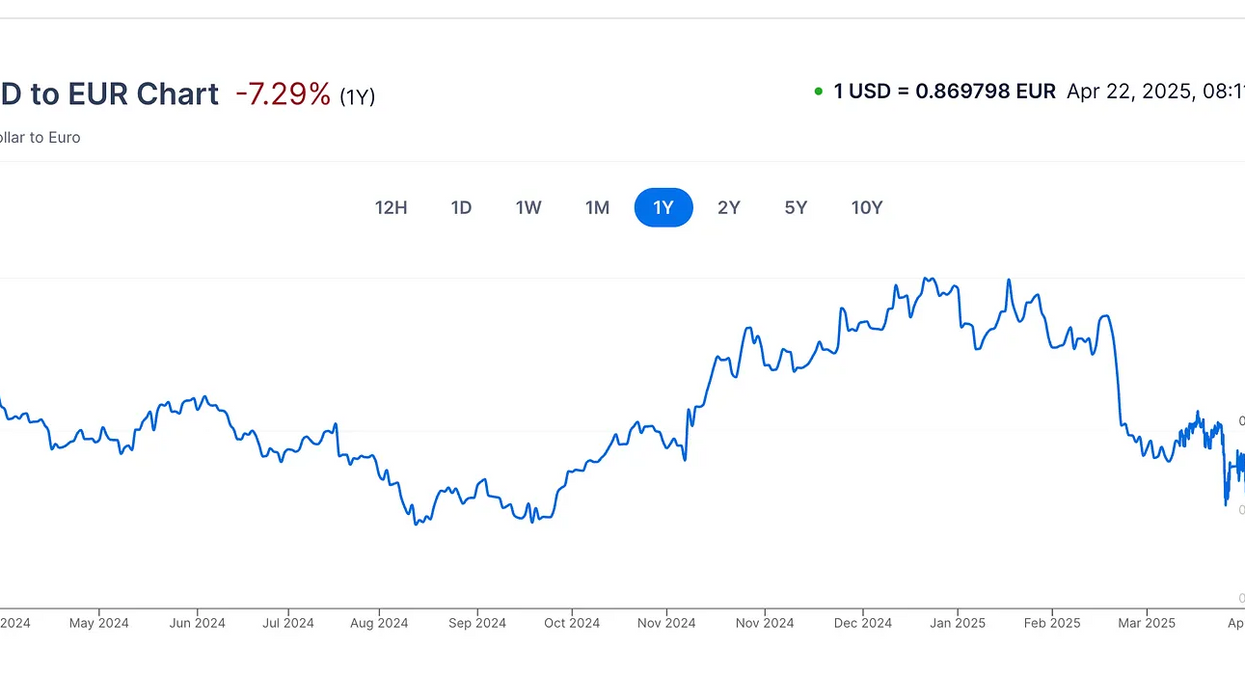
US dollar to Euro value
Bloomberg posted an article titled “Markets Are Discovering the Real Trump Trade Is ‘Sell America’.” That’s about right. Look at the value of the dollar on international markets, shown at the top of this post. For a while after the election investors loved Trump, not wisely but too well. But in the face of one idiotic policy move after another, they’ve gradually fallen out of love, and now seem to be capitulating. I think they still haven’t faced up to how bad it is, but they’re figuring it out.
What we’re seeing now is something familiar to those of us who have studied economic crises in other countries, usually but not always emerging markets. For this is looking more and more like a “sudden stop.” That’s what happens when a country that has relied on large inflows of foreign capital loses the confidence of international investors. The inflow of money dries up — and the economic consequences are usually ugly.
Trump inherited an economy in remarkably good shape. We’d had “immaculate disinflation”: The inflation spike of 2021-22, largely caused by Covid-related supply chain disruptions, had faded away without a large rise in unemployment:

Source: St. Louis Federal Reserve
But Trump wasted no time in squandering the hand he’d been given. It’s not just the destructive tariffs. It’s also the chaos, as policy zigzags wildly, and the craziness. If you were a foreign investor, would you want to bet on America right now? Would you even want to visit to look at investment prospects, given the risk that you might be imprisoned by ICE because you once sent a text critical of Trump?
The economic consequences of sudden stops are, as I said, usually ugly. I’m writing this from Portugal, which — along with other southern European nations — was hit by a sudden stop in capital inflows just as it was recovering from the global financial crisis of 2008. The result was another severe economic slump that produced immense misery:

Can the United States suffer comparably? We have some big structural advantages that, say, Portugal in 2011 or Argentina in 2001 lacked. Above all, America’s foreign debt is overwhelmingly in dollars. This means that a plunging dollar won’t cause the domestic-currency value of our debt to explode, the way it typically does in emerging-market crises. And U.S. businesses and individuals have large overseas investments that will become more valuable in dollar terms as the dollar falls. As a result, the Trump slump in the dollar will, at least temporarily, lead to an improvement in our international investment position, the difference between U.S. assets and liabilities.
On the other hand, Portugal in 2011 or even Argentina in 2001 had mostly sane leadership. We don’t. As a number of people have pointed out, there may be no other government in the world that would have kept Pete Hegseth in office given his performance so far.
And as things get worse, there’s no reason at all to believe that Trump and those around him will look for policy solutions. Instead, we’ll see a combination of denial and efforts to blame someone else. Trump has already declared that reports of rising prices are “fake news.” And he’s already setting the stage for making Jerome Powell — “Mr. Too Late” and “a major loser” — his scapegoat for everything that goes wrong.
Coming next are conspiracy theories.
[Screengrab may have been fake?]
None of this was necessary. The U.S. economy was doing well before Trump came into office. Trumponomics isn’t a response to real problems. It’s a president who has waged a war on competence indulging his personal obsessions.
But America and the world will suffer the consequences.
Paul Krugman is a Nobel Prize-winning economist and former professor at MIT and Princeton who now teaches at the City University of New York's Graduate Center. From 2000 to 2024, he wrote a column for The New York Times. Please consider subscribing to his Substack, where he now posts almost every day.
Reprinted with permission from Paul Krugman.
Reprinted with permission from Substack.
- Trump's State Media Struggling To Justify His Economic Failure ›
- Over And Over, Trump Kicks America's Farmers In The Teeth ›
- New Polls Show Voters Rapidly Turning On Trump Over Economy ›
- Trump Will Inherit Booming Economy, Declining Crime From Biden ›








